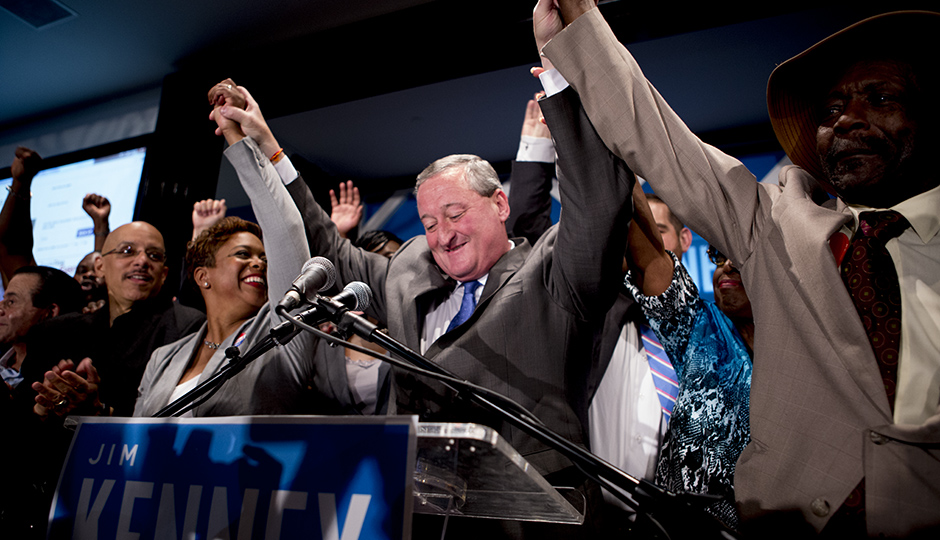Progressives Won the Philly Election? You Sure About That?
Philadelphia is suddenly a progressive utopia.
At least, that’s what you might believe after reading articles about the city’s primary election in the national media.
“Jim Kenney, a former Philadelphia city councilman who has cast himself as a progressive in the mold of Mayor Bill de Blasio of New York, handily defeated five other candidates to win the Democratic nomination for mayor Tuesday,” reads the first sentence of The New York Times article about the race.
The Atlantic went a step further, writing that “progressives scored a victory” because the mayoral race “pitted a crusading left-winger against a charter-school advocate backed by suburban hedge-fund magnates” and “this time, the left-winger … actually won.” Even Will Bunch of the Philadelphia Daily News declared that it was a new day after Kenney, “who ran on the most progressive platform of a major Philadelphia mayoral candidate in our lifetimes,” won in a landslide, at the same time that education activist Helen Gym succeeded in her campaign for City Council.
Not so fast.
Yes, “New Kenney,” as Philadelphia magazine likes to call him — an early supporter of LGBTQ rights and marijuana decriminalization, who promised on the campaign trail to expand pre-K and eliminate stop-and-frisk — won the mayor’s race. And that wasn’t the only feather in Progressive Philly’s cap.
As Bunch noted, Gym, the city’s leading advocate for traditional public schools, was victorious in the highly competitive Democratic City Council At-Large race. So was Councilman Bill Greenlee, who spent seven years fighting to pass paid sick leave legislation in Philly and finally prevailed this winter. And Frank Rizzo, the son of the former tough-on-crime mayor of the same name, was defeated in his bid for an at-large seat (hopefully snuffing out the Rizzo flame in City Hall forever).
But Election Day also dealt a number of blows to Philly progressives, especially in the Democratic at-large race.
Allan Domb, a wealthy developer and realtor whose nickname is the “condo king,” succeeded in that battle. He only switched his party registration to Democrat from Independent this year. The city’s GOP, in fact, courted him to run for mayor just this February. He’s also been a big beneficiary of the city’s property tax abatement. Whether all that is good or bad depends on where you fall on the political spectrum. But it’s definitely not progressive.
At the same time, voters kicked out progressive Councilman At-Large W. Wilson Goode Jr., who has been a relentless critic of the same tax abatement as well as a fierce champion of a higher minimum wage. He was endorsed by such liberal groups as Pennsylvania Working Families and Action United.
Paul Steinke and Sherrie Cohen, two gay at-large candidates, also lost. How progressive are Philly voters if they have never, ever in the history of the city elected an out person to City Council?
Meanwhile, Manny Morales, whose Facebook page praised voter ID, questioned abortion rights, and compared gay men to flatworms, came within just 865 votes of winning the 7th District Council race. And Greenlee came within only about 3,000 votes of losing the at-large race.
It should be noted that Derek Green, who finished first in the Democratic at-large brawl, doesn’t fit neatly into either the “win” or “lose” column for the city’s progressives. As a former top aide to Councilwoman Marian Tasco, he is a protégé of Philadelphia’s old guard. But he is also a graduate of the celebrated Center for Progressive Leadership.
Likewise, some may argue the city’s presumptive next mayor isn’t a slam-dunk for progressives. He certainly wasn’t an outsider like de Blasio, and calling him a “left-winger” is going a little far. Kenney’s opponents questioned his progressive bona fides repeatedly during the mayor’s race, pointing out that he was a former staffer to ex-state Sen. Vince Fumo, a past supporter of school vouchers, and a onetime enemy of bikers.
While his legislative record shows that he made a fairly clear and consistent move from being a moderate-conservative to a progressive over a couple decades, it’s also true that many people who cast a ballot for Kenney were likely voting for “Old Kenney.” And those people will be in his ear (and possibly his administration).
The point is, Election Day painted a rather complicated picture about Philadelphia’s political leanings.
What does that mean for the city going forward? Progressives may have won the mayor’s race, but the real battle is just beginning. They’ll have to fight to get Kenney’s progressive agenda passed on Council — and to keep the mayor’s seat from slipping into the hands of Old Kenney.
